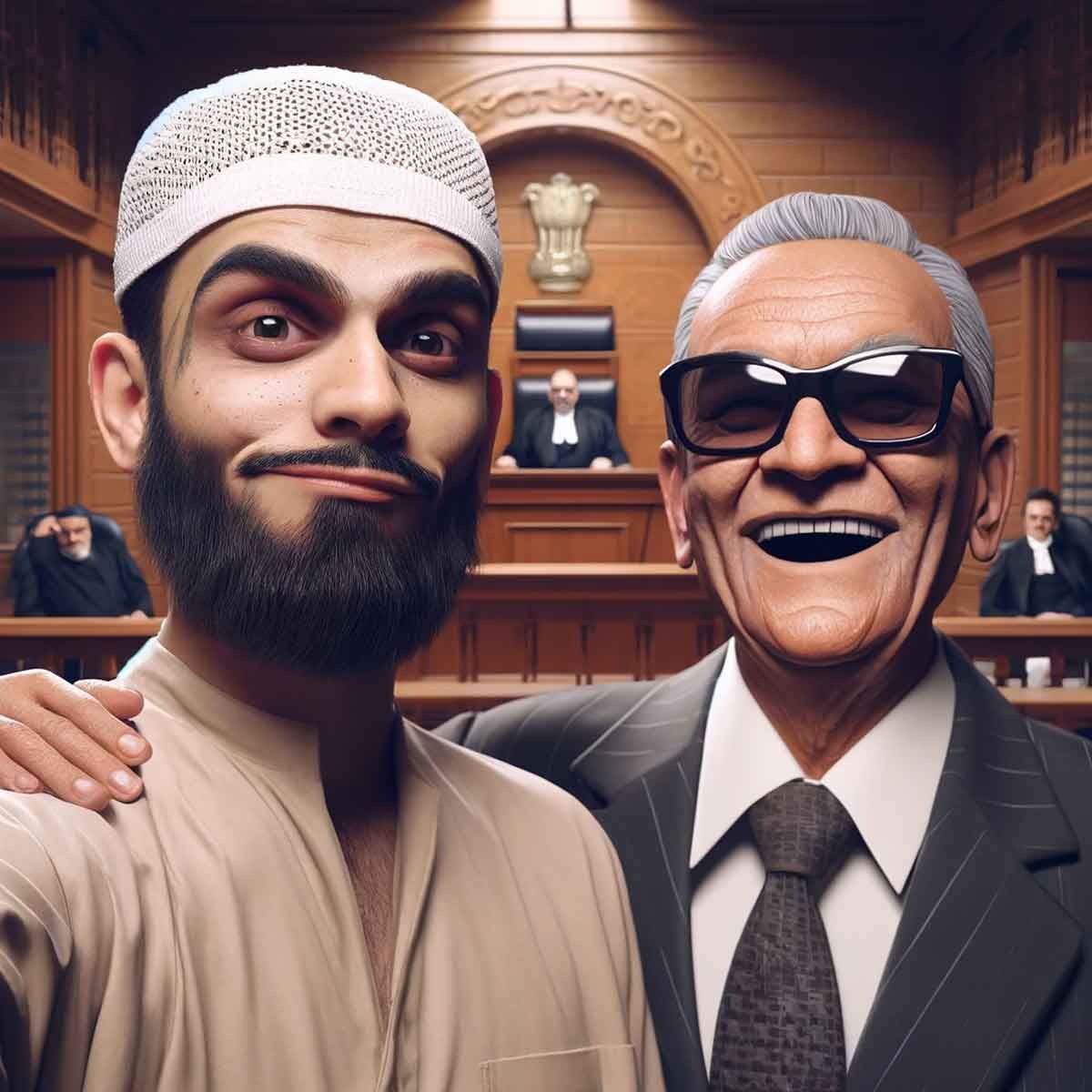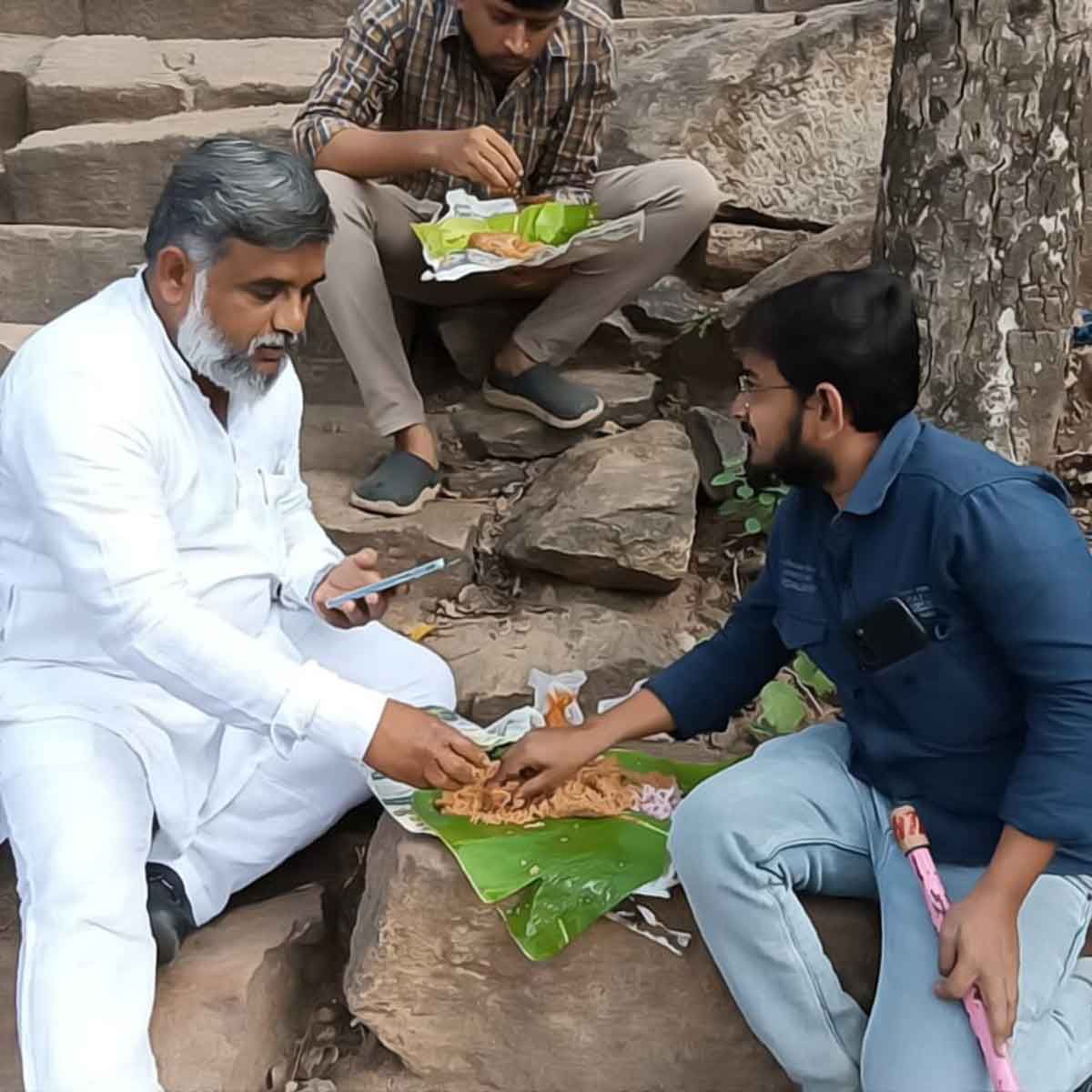More Coverage
Twitter Coverage
JOIN SATYAAGRAH SOCIAL MEDIA
"अल्हम्दुलिल्लाह!!! Mob has no religion": The Rajasthan High Court grants bail to 18 Islamists accused in the Hindu Shobha Yatra attack in Chittorgarh, highlighting the challenges of pinpointing culprits amidst the chaos of mob-induced communal violence

On May 20th, the Rajasthan High Court made a pointed observation about the nature of mobs during communal clashes, declaring that "a mob has no religion." This statement was part of the proceedings where the court granted bail to eighteen accused who were directly involved in an attack on a Hindu religious procession. This incident took place on March 19th in Chittorgarh, Rajasthan, and tragically led to the death of 55-year-old Shyam Lal Chheepa, while several others were left injured.
|
The court highlighted the inherent difficulties in identifying the specific individuals to blame for the "eruption of affray" or for causing injuries in the tumult that followed the clash between two community groups, during which religious feelings were reportedly offended. According to Justice Farjand Ali, discerning the guilty from the innocent in instances of mob violence poses a significant challenge. This complexity influenced the court's decision to grant bail, acknowledging the challenges in pinpointing individual accountability within the chaotic dynamics of a mob.
The court elaborated on the complexities of handling situations involving large groups, where pinpointing individual actions becomes particularly challenging. The justices explained, "There is no religion of a mob. When a large group of people is alleged to have committed an offence, it becomes a very tedious task to make separation between the innocent and the real culprits." This statement reflects the judicial understanding that during disturbances, a variety of people may gather: some out of curiosity, some out of fear, and others just to see what is happening. This mix often creates a chaotic environment where "the real culprits make their escape good, whereas the mere onlookers may be booked."
The context of this chaotic scenario was particularly relevant in the case being addressed, where the accused were arrested on charges of a pre-meditated assault. It was alleged that they employed deadly weapons against innocent devotees during the Hindu Shobha Yatra in Chittorgarh. In response to these severe allegations, legal provisions were stringently applied, including Section 302 of the Indian Penal Code, which pertains to murder, and additional charges under the Scheduled Caste and Scheduled Tribe (Prevention of Atrocities) Act. These laws were invoked to address the gravity of the accusations, underscoring the seriousness with which the authorities treated the incident.
|
The legal journey for the defendants took a significant turn when they sought relief from the Rajasthan High Court after their initial plea for release was denied by a trial judge. Upon reviewing the case, the High Court decided to grant bail to the defendants. During the proceedings, the court acknowledged the complexities involved in determining whether the accusations actually fell within the scope of the SC/ST Act, leaving this determination to the trial court. The justices clearly stated, "At this stage, it would be unsafe to make any comment regarding the culpability of the appellants." This caution underscores the judicial principle of reserving judgment until all facts are thoroughly examined during the trial.
Further complicating the case was the cause of the deceased's death. The court discussed the possibility that the death of the individual might not have been due directly to the assault but could have been caused by a heart attack. This consideration arose from medical reports indicating that the deceased had only sustained a minor injury to his knee. The court pointed out that such an injury was unlikely to be fatal, suggesting that the cause of death might not be directly linked to the violence during the procession.
|
The judge further scrutinized the medical evidence pertaining to Shyam Lal Chheepa's death, examining the details of the postmortem report, which revealed minimal physical trauma. "I have perused the postmortem report of deceased Shyam Lal Chheepa available on the case diary and it does not reveal any internal or external injuries except one simple abrasion of 1.5 cm. x 0.5 cm. on the right knee and the opinion for which is given as simple blunt. Any prudent person can presume that the same could not be the cause of death since no blood was oozing out," stated the judge, highlighting the lack of severe injuries. The judge also noted the absence of a conclusive medical opinion on the cause of death, mentioning that "There is no opinion of the medical board regarding the cause of death. The viscera of the deceased have been preserved and sent for chemical examination. Probably the cause of death was a heart attack or Myocardial infarction."
In the conclusion of the hearing, the court carefully weighed the circumstances surrounding the prolonged detention of the appellants and the slow progress of the trial. The court expressed its position, "This court would not like to comment on the niceties of the matter at this stage, however, in view of the deliberation and enunciation made in the above order and looking to the fact that the appellants are in judicial custody since long and early culmination of the trial is not a seeming fate, no fruitful purpose would be served by keeping them behind the bars, in the totality of the facts and circumstances of the case, it is deemed appropriate to grant indulgence of bail to the appellants."
|
In the final decision regarding the bail of the accused, the Rajasthan High Court stipulated specific conditions for their release. The court ordered that the accused could be released on bail provided they were not involved in any other legal cases. To secure their release, each accused was required to provide a personal bond of Rs. 50,000 and two sureties amounting to Rs. 25,000 each. Additionally, they were mandated to ensure regular attendance in court, adhering to all specified hearing dates and responding promptly whenever summoned by the court.
This decision to set bail with clear conditions underscores the court's approach to balancing the rights of the accused with the need to ensure their accountability and presence during the ongoing legal proceedings. It reflects a judicial commitment to maintaining procedural integrity while also considering the broader context of the case, where conclusive evidence about the direct cause of the fatality was still pending. The court's careful consideration in setting these terms aimed to prevent any potential evasion of justice, while also recognizing the prolonged duration the appellants had already spent in custody and the slow progress of the trial.
 Support Us
Support Us
Satyagraha was born from the heart of our land, with an undying aim to unveil the true essence of Bharat. It seeks to illuminate the hidden tales of our valiant freedom fighters and the rich chronicles that haven't yet sung their complete melody in the mainstream.
While platforms like NDTV and 'The Wire' effortlessly garner funds under the banner of safeguarding democracy, we at Satyagraha walk a different path. Our strength and resonance come from you. In this journey to weave a stronger Bharat, every little contribution amplifies our voice. Let's come together, contribute as you can, and champion the true spirit of our nation.
 |  |  |
| ICICI Bank of Satyaagrah | Razorpay Bank of Satyaagrah | PayPal Bank of Satyaagrah - For International Payments |
If all above doesn't work, then try the LINK below:
Please share the article on other platforms
DISCLAIMER: The author is solely responsible for the views expressed in this article. The author carries the responsibility for citing and/or licensing of images utilized within the text. The website also frequently uses non-commercial images for representational purposes only in line with the article. We are not responsible for the authenticity of such images. If some images have a copyright issue, we request the person/entity to contact us at satyaagrahindia@gmail.com and we will take the necessary actions to resolve the issue.
Related Articles
- In another shocker, Supreme Court quotes 'every sinner has a future' and commutes death sentence of Mohd Firoz for rape & murder of 4-year-old girl: Child brutally assaulted, two teeth broken while smothering after rape
- Calcutta Quran Petition: A petition to ban the Quran altogether was filed 36 years ago, even before Waseem Rizvi petitioned for removing 26 verses from Quran
- Twitter rewards an Islamist org, set to be banned by India, with a verified blue tick: Here is what PFI has done in the past
- Hindu side filed reply in Supreme Court: 'Gyanvapi property belonged to Lord Adi Vishweshwar since time immemorial, even before the Islamic rule in India, and hence cannot be handed to anybody'
- Why Hindus not claiming their temples back from the Government control: Is pro-Hindu govt will always be in power
- 'Found stone carvings of Hindu Gods-Goddesses, lotus, Seshnaag, Shrigar Gauri shrine distinctly visible, absolute remnants of ancient Hindu temple': Survey commissioner Ajay Mishra reports, Muslim side continuously uncooperative
- Writ petition of Irfan scrapped by Allahabad High Court of seeking permission for Azaan on loudspeakers in the mosque, says ‘not a fundamental right’: Read details of the case
- Shivling discovered in the Gyanvapi complex during a survey after the water was pumped out of a well that Muslims were using as 'Wuzukhana' for washing their hands and feet before offering Namaz
- "न्याय, मलाई मार के": In 1992, hundreds of Hindu girls were exploited in the Ajmer gangrape case by 'Khadims' of the Dargah and ex-Congressman Nafis Chisti, with the perpetrators only being convicted by the POCSO court after a long, grueling 32 years
- Madhya Pradesh HC accepted petition for stay on Muslims performing Namaz in the compound of Bhojshala monument: Read how an educational centre and a historic temple of Goddess Saraswati became Kamal Maulana mosque






















